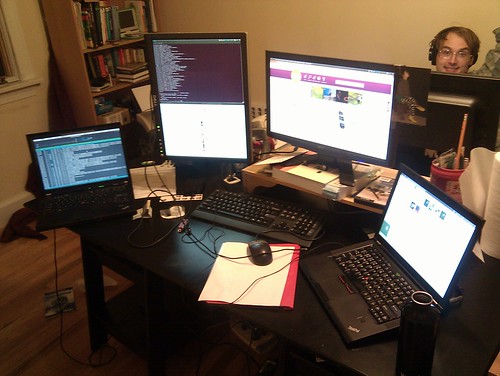Traditional employees – those that get up for work at six, get into the office at eight, and stay till four or five – are beginning to go the way of the dodo.
Sure, they’re not becoming extinct quite as quickly as most people have claimed – but make no mistake about it, the ways that companies employ people have been shifting in changing for years now in the process is only beginning to accelerate as time goes on.
More and more businesses are looking to outsource on a regular basis, and more traditional businesses – as well as very smart and savvy entrepreneurs – are looking to take advantage of remote workers. This gives a whole new spin to the “work from home” community, and is something that you definitely want to look into if you’re running your own business.

Switchboard operators in 1914 handled things a little differently than we do today. The ability to manage a team remotely has come a long way with technology advances since the turn of the century.
Why move forward with remote workers in the first place?
The first thing that you’re really going to want to figure out is if it makes sense to hire remote workers for your business in the first place.
In most instances, you’re going to find remote workers to be considerably less expensive than traditional workers – if only because you’re able to hire them on as “independent contractors”, and won’t have to pay all of the benefits that you would have had to pay a full-time or part-time worker.
At the same time, you’re also able to hire remote workers from anywhere around the planet – literally bringing in a multinational workforce that may be willing to work for pennies on the dollar. This allows you to keep your expenses low and enjoy bigger profits, something that every business on the planet is looking to do.
Finally, because you’re able to hire people all around the globe, your business never has to be closed. You can have teams of remote workers working around the clock (simply because of the beauty of time zones), while they feel as though they are putting in a traditional workday. This allows you to get much more done much more quickly, without having to do any of the “heavy lifting” on your own.
Hiring and communicating with remote workers
The other side of the coin is that you’ll need to sort through a tremendous amount of remote workers to find a dedicated team of experts that you can actually rely on and trust.

You don’t have to keep multiple computer screens to track remote workers. Having email alerts from freelancer sites and a single email forward can do the trick.
You’re going to find that the world of remote worker prospects is absolutely packed to the gills, as you’re talking about an employee pool that is global in scale. Literally hundreds of millions of people are willing to work in a remote worker position, and you’re going to have to sort through the very best of the best to bring the right people onto your team.
You’ll want to look for experience, past remote working record, and a whole host of other things as you move through the interview process – but much of it should be the same as the process you would have used to hire a traditional employee.
As far as communication is concerned, email text messaging, and a whole host of other communication technologies make it possible to run a “digital office” with almost no effort whatsoever.
About the Author – Issa Asad

